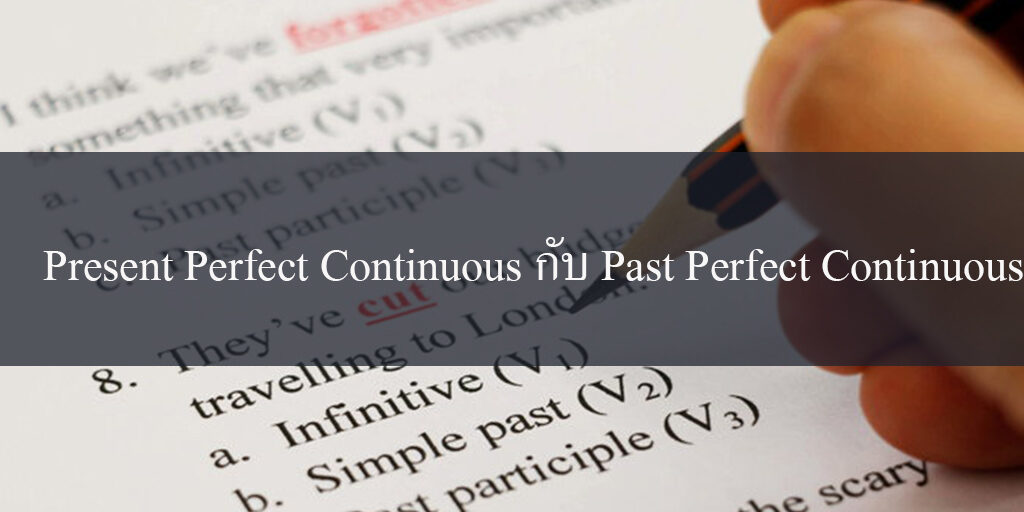เรียนรู้ภาษาอังกฤษ ม.ปลาย เรื่อง Tenses Present Perfect Continuous , Past Perfect Continuous และ present perfect
– We have been living here since 1987.
= We came here in the past and we are still living here now.
= She’s still waiting now.
– I‘ve been studying English for eight years.
= She’s still studying English now.
– James has been painting that door since three o’clock and he hasn’t finished it yet.
หมายเหตุ เหตุการณ์ ทั้งหลายเหล่านี้ยังไม่เสร็จสิ้นลง
– The workmen have been digging up the raod and now the traffic cannot pass.
– What have you been eating? Your lips and chin are purple.
– We have been driving along muddy roads and now the car is dirty.
– He has been drinking and can’t walk straight .
– He has been studying all night and has fallen aslep in class.
|
โครงสร้าง
|
Subject + has/have + been + V.-ing
|
||||||||||||||
|
ประโยคบอกเล่า |
I / You / We / They | have | been | working | in the office. | ||||||||||
| He / She / It | has | been | watching | the television. | |||||||||||
|
โครงสร้าง
|
Subject + has/have + not + been + V.-ing
|
||||||||||||||
|
ประโยคปฏิเสธ |
I / You / We / They | have | not | been | working | in the office. | |||||||||
| He / She / It | has | not | been | watching | the television. | ||||||||||
|
โครงสร้าง
|
Has/Have + Subject + been + V.-ing?
|
||||||||||||||
|
ประโยคคำถาม |
Have | I / you / we / they | been | working | in the office? | ||||||||||
| Has | he / she / it | been | watching | the television? | |||||||||||
|
โครงสร้าง
|
Who/What/Where/When/Why/How + has/have + Subject + been + V.-ing?
|
||||||||||||||
|
ประโยคคำถาม |
Who | have | I / you / we / they | been | talking to? | ||||||||||
| Where | has | he / she / it | been | sleeping? | |||||||||||
Past Perfect Continuous
– รูปแบบประโยคคือ Subject + had (ใช้กับประธานได้ทุกตัว เป็นรูปอดีตของ has/have) + been + V. ing
– ใช้เมื่อต้องการจะบอกถึงเหตุการณ์ที่เกิดขึ้นมาในอดีตมาสักพักแล้ว (เหตุการณ์ที่ 1) จนกระทั่งมีอีกเหตุการณ์ (เหตุการณ์ที่ 2) เกิดขึ้นมาแทรก โดยที่เนื้อหาหลักที่ประโยคลักษณะนี้ต้องการสื่อ คือจะบอกว่าเหตุการณ์ที่ 1 เกิดขึ้นมาเป็นระยะเวลานานแค่ไหน ก่อนที่เหตุการณ์ที่ 2 จะเกิด
– สังเกตว่าเหตุการณ์ที่ 2 จะใช้กริยาช่อง 2 เพราะว่าเป็นเหตุการณ์ที่เกิดในอดีตไปแล้วเหมือนกัน
– เมื่อเป็นประโยคคำถาม สามารถเรียงประโยคได้ตามนี้
Had + subject + been + V.ing?
– เมื่อเป็นประโยคปฏิเสธ จะใส่คำว่า not ไว้ตรงกลาง
Subject + had + not + been + V.ing
Ex. I had been looking for this book for the whole day when you found it.
(ฉันหาหนังสือเล่มนี้มาทั้งวันแล้ว ก่อนที่คุณจะเจอมัน)
Ex. They had been working on the presentation for few hours when the boss came in the office.
(พวกเขาทำพรีเซนเทชั่นกันมาสองสามชั่วโมงแล้วตอนที่เจ้านายเข้ามาที่ออฟฟิศ)
Ex. I had been playing tennis for an hour when you arrived.
(ฉันเล่นเทนนิสมาหนึ่งชั่วโมงก่อนที่คุณจะมาถึง)
S + has/have + V3
หลักการใช้
1. ใช้กล่าวถึงเหตุการณ์ที่เกิดขึ้นในอดีต และยังดำเนินหรือมีผลต่อเนื่องมาจนถึงปัจจุบัน มักมีคำว่า since และ for อยู่ด้วย
2. ใช้กล่าวถึงเหตุการณ์ที่เพิ่งกระทำเสร็จสิ้นใหม่ๆ จะมีคำว่า just , recently (=lately ) = (not long ago) และ
lately ใช้กับประโยคคำถามและปฏิเสธ
– Have you finished your assignment?
– Yes, I have just finished it.
– The results have just been announced.
– He has recently got married.
– Have you been there lately?
3. ใช้กับคำว่า yet และ already
yet (ยัง) ใช้กับ Question , Negative Answer และ Negative Statement
already (เรียบร้อยแล้ว) ใช้กับ Affirmative Statement และ Affirmative Answer
– We have not yet read that book. (Neg. St.)
– Has he come back yet ? (Question)
– No, he has not come back yet. (Neg. Ans.)
– Yes, he has already come back.
– Yes, he has come back already.
**** already เมื่อเป็นการแสดงความประหลาดใจของผู้พูดจะใช้ในประโยคคำถาม
– Have you finished your report already?
4. ใช้กล่าวถึงเหตุการณ์ในอดีตและยังไม่จบในขณะที่พูด จะมีคำว่า ever , never
ever ใช้กับ Question
never ใช้กับ Negative Statement และ Negative Answer
– Have you ever been to America? (Question)
– No, I have never been there. (Neg. Ans.)
– Yes, I have been there .
– I have never palyed ice-skating. (Neg, St.)
5. ใช้กล่าวถึงเหตุการณ์ที่เกิดขึ้นในอดีต แต่ไม่ได้บ่งเวลาที่เกิดขึ้นให้ชัดเจน จะมีคำว่า up to the present time ,
until now , so far , so far this month , at last,
– Up to the present time we have had no news from John.
– I have received no answer from him so far.
– He has finished his report at last.
6. ใช้กล่าวถึงเหตุการณ์ที่เกิดซ้ำซากหลาย ๆ ครั้ง จะมีคำว่า many times, several times , over and over
– I have been to Hua-Hib many times.
– She has seen “Jurassic Park” several times.
– We have studied Tenses over and over.
7. ใช้กล่าวถึงเหตุการณ์ในอดีตที่สิ้นสุดลงแล้ว แต่เกี่ยวเนื่องกับเหตุการณ์หนึ่งซึ่งเกิดขึ้นในปัจจุบันหรืออนาคต
– Janet has bought a car so that she will have transportation to work.
– He has studied all day so that he can go to the dance tonight.
8. ใช้กับเหตุการณ์ที่เกิดขึ้นในช่วงระยะเวลาหนึ่ง ซึ่งยังไม่สิ้นสุด จะมีคำว่า this month , this year
– Have you had a holiday this year?
– You have done a lot of work this morning.
– I have read two books this week.
9. ใช้ในบทสนทนา จดหมาย รายงาน หนังสือพิมพ์
Conversation — I have lost my keys. Have you seen them? Yes, I have seen them.
Yes, I saw them yesterday. (ถ้ามีเวลาบอก ใช้ past simple)
Letters – — Dear James,
I’m sorry that I haven’t written to you for such a long time but I have been
very busy working for an examination.






